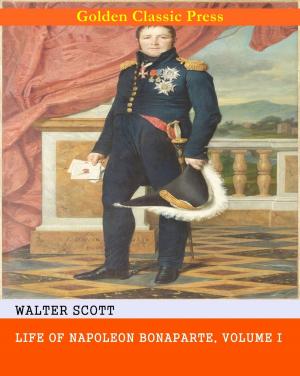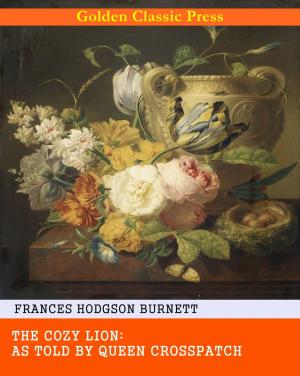| Author: | William Harrison Ainsworth | ISBN: | 1230002954004 |
| Publisher: | GOLDEN CLASSIC PRESS | Publication: | November 30, 2018 |
| Imprint: | Language: | English |
| Author: | William Harrison Ainsworth |
| ISBN: | 1230002954004 |
| Publisher: | GOLDEN CLASSIC PRESS |
| Publication: | November 30, 2018 |
| Imprint: | |
| Language: | English |
*** Original and Unabridged Content. Made available by GOLDEN CLASSIC PRESS***
Synopsis:
The leader of the troop, a very striking personage, whom it was impossible to regard without interest, was a man of large stature, with handsome, strongly-marked features, very stern in expression. An ample chest and muscular throat indicated the possession of great personal strength, but his frame, though stalwart, was admirably proportioned, and it was easy to discern, from the manner in which he bestrode his steed—a powerful block charger—that he was a consummate horseman. His looks and deportment were those of one accustomed to command. If not absolutely young, he was in the very prime of life, being just thirty-three. His complexion was swarthy, his eyes dark and piercing, and his beard, which he wore exceedingly long, black as jet. His firm-set mouth betokened inflexible resolution, while his towering forehead indicated great sagacity. Though he was magnificently arrayed, his bearing showed that he was not one of the silken gallants who thronged the gay and chivalrous court of François I., and who delighted in the banquet, the masquerade, or the tournay—but a hardy warrior, who had displayed prowess in the field, and could lead hosts to conquest. Like his followers, this noble-looking personage was Clad in black velvet, but his habiliments were ornamented with precious stones. His girdle was set thick with gems, as was the handle of his poniard, and his plumed toque was ornamented in a similar manner. Around his neck he wore the superb collar of the order of Saint Michael, bestowed upon him by François I., and upon the caparisons of his steed was embroidered a sword, a symbol of the dignity with which he had been invested some eight years ago, on the accession of the Duke d'Angoulême to the throne of France. This noble warrior, who equalled Roland in bravery and military science, was the illustrious Charles de Bourbon, Constable of France. At this time Bourbon was the most redoubtable person in the kingdom, as well from his daring and ambitious character, as from the power which he derived from his vast possessions. As the second prince of the blood—the Duc d'Alençon being the first—he was not many degrees removed from the throne, which the descendants of his house occupied at a later period. Sprung from Saint Louis, by that monarch's sixth son, he was head of the branch Bourbon-Montpensier, and had espoused Suzanne, daughter of the Duchess Bourbon-Beaujeu, herself the eldest daughter of Louis XI., and widow of Duke Pierre de Bourbon. The Duchess Suzanne had died about six months previously, leaving Bourbon without issue, for her three children had preceded her to the grave. The Constable de Bourbon's possessions were immense. Whole provinces belonged to him, in which he exercised feudal sovereignty. His titles were Duke de Bourbon, Duke d'Auvergne, Comte de Montpensier, Comte de Forez, Comte de la Marche, Vicomte of Carlat and Murat, and Seigneur of Combrailles and La Roche en Reigniers. In Poitou he had the duchy of Châtelleraut, and in Picardy the earldom of Clermont. These vast possessions, combined with his pretensions to the throne and ambitious character, naturally excited the jealousy of François I. Other causes conspired to heighten the king's dislike of him. The victory of Marignan, which signalised the first campaign of François in Italy, and gained for him the duchy of Milan, was virtually won by Bourbon. Though the Constable did not boast of the achievement, his haughty manner offended the king, who sought on several occasions to lower his pride, but only succeeded in irritating him. In Louise de Savoie, Duchess d'Angoulême, and mother of the king, Bourbon found an active and powerful enemy. Though she was thirteen years older than the Constable, the duchess had conceived a violent passion for him, and, in order to forward his ambitious views, Bourbon feigned to respond to it. But he soon threw off the mask, and treated her with indifference.
*** Original and Unabridged Content. Made available by GOLDEN CLASSIC PRESS***
Synopsis:
The leader of the troop, a very striking personage, whom it was impossible to regard without interest, was a man of large stature, with handsome, strongly-marked features, very stern in expression. An ample chest and muscular throat indicated the possession of great personal strength, but his frame, though stalwart, was admirably proportioned, and it was easy to discern, from the manner in which he bestrode his steed—a powerful block charger—that he was a consummate horseman. His looks and deportment were those of one accustomed to command. If not absolutely young, he was in the very prime of life, being just thirty-three. His complexion was swarthy, his eyes dark and piercing, and his beard, which he wore exceedingly long, black as jet. His firm-set mouth betokened inflexible resolution, while his towering forehead indicated great sagacity. Though he was magnificently arrayed, his bearing showed that he was not one of the silken gallants who thronged the gay and chivalrous court of François I., and who delighted in the banquet, the masquerade, or the tournay—but a hardy warrior, who had displayed prowess in the field, and could lead hosts to conquest. Like his followers, this noble-looking personage was Clad in black velvet, but his habiliments were ornamented with precious stones. His girdle was set thick with gems, as was the handle of his poniard, and his plumed toque was ornamented in a similar manner. Around his neck he wore the superb collar of the order of Saint Michael, bestowed upon him by François I., and upon the caparisons of his steed was embroidered a sword, a symbol of the dignity with which he had been invested some eight years ago, on the accession of the Duke d'Angoulême to the throne of France. This noble warrior, who equalled Roland in bravery and military science, was the illustrious Charles de Bourbon, Constable of France. At this time Bourbon was the most redoubtable person in the kingdom, as well from his daring and ambitious character, as from the power which he derived from his vast possessions. As the second prince of the blood—the Duc d'Alençon being the first—he was not many degrees removed from the throne, which the descendants of his house occupied at a later period. Sprung from Saint Louis, by that monarch's sixth son, he was head of the branch Bourbon-Montpensier, and had espoused Suzanne, daughter of the Duchess Bourbon-Beaujeu, herself the eldest daughter of Louis XI., and widow of Duke Pierre de Bourbon. The Duchess Suzanne had died about six months previously, leaving Bourbon without issue, for her three children had preceded her to the grave. The Constable de Bourbon's possessions were immense. Whole provinces belonged to him, in which he exercised feudal sovereignty. His titles were Duke de Bourbon, Duke d'Auvergne, Comte de Montpensier, Comte de Forez, Comte de la Marche, Vicomte of Carlat and Murat, and Seigneur of Combrailles and La Roche en Reigniers. In Poitou he had the duchy of Châtelleraut, and in Picardy the earldom of Clermont. These vast possessions, combined with his pretensions to the throne and ambitious character, naturally excited the jealousy of François I. Other causes conspired to heighten the king's dislike of him. The victory of Marignan, which signalised the first campaign of François in Italy, and gained for him the duchy of Milan, was virtually won by Bourbon. Though the Constable did not boast of the achievement, his haughty manner offended the king, who sought on several occasions to lower his pride, but only succeeded in irritating him. In Louise de Savoie, Duchess d'Angoulême, and mother of the king, Bourbon found an active and powerful enemy. Though she was thirteen years older than the Constable, the duchess had conceived a violent passion for him, and, in order to forward his ambitious views, Bourbon feigned to respond to it. But he soon threw off the mask, and treated her with indifference.















